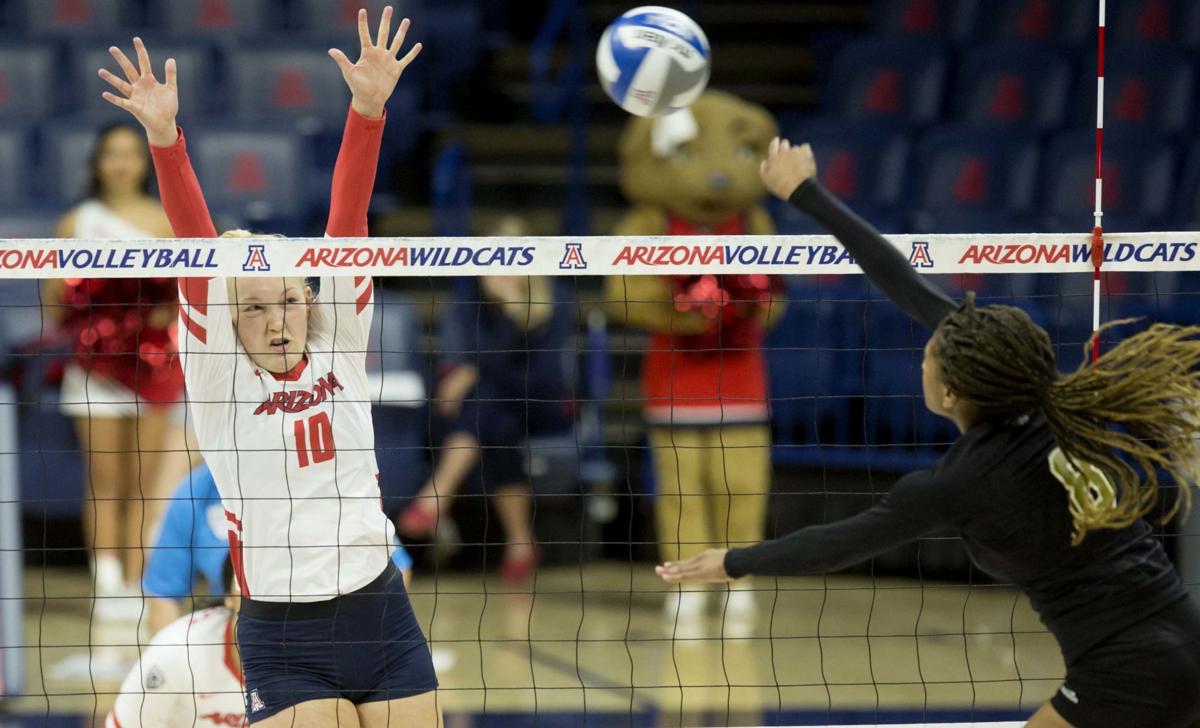Paige Whipple has had those days during the last six months. You know, those moments where it all — the pandemic, the social distancing, the new normal — gets to be a little too much.
One time, she even cried in front of her mom, Taffy, and her sister, Hannah, for reasons that she still can’t explain. Whipple said she “didn’t have any words” to describe what she was feeling.
Then she turned to the one thing that puts her at ease and centers her — music.
“I went up in my room and I just started playing my guitar and singing,” Arizona’s senior outside hitter said. “My sister came upstairs and was like, ‘I had a feeling you were playing your guitar.’
“There were a lot of little moments where it was a good escape for me and it helped me to calm my anxieties, relax and be in the moment rather than stressing about what was going to come.”
Whipple is the only returning senior on an Arizona volleyball squad coming off an injury-riddled 15-17 season. The outlook for this year is good, provided the Wildcats can stay healthy. The UA’s freshman class ranks seventh in the nation and first in the Pac-12.
When will the season start? Wednesday, the Wildcats got a few answers.
The NCAA announced that volleyball, typically a fall sport, would run from Jan. 22-April 10, with the postseason starting April 16. The Pac-12’s schedule will likely fit the NCAA’s framework.
Music has been part of Whipple’s life from a young age. She started taking piano lessons at age 3, following in her sister’s footsteps. Even after sports began to occupy her free time, Whipple sang in her church and school choirs and played viola in the school orchestra. She has taught herself to play both the guitar and ukulele; Fleetwood Mac’s “Landslide” is one of her favorites.
“Music always came naturally to me and it was really fun for me to learn music,” Whipple said. “I taught myself how to play the guitar. I asked for one for Christmas and went on YouTube and started learning. That’s a work in progress. I also made it a goal to improve my guitar skills. At one point, my fingers were calloused so bad that there was barely any skin left — I was playing for hours a day, every day.”
Whipple returned to her hometown of Salem, Oregon, in March, staying there until August. While home, Whipple improvised when it came to strength training. She did creative workouts in her garage and driveway that were designed by the UA trainers. She used water gallons and Gatorade jugs as weights.
Whipple also practiced with her old beach volleyball club, North Pacific Juniors, three days a week. She hadn’t played beach volleyball since high school, but wanted to touch the ball and be competitive again.
“All I did all summer was work on seeing the court and hitting off-speed shots to the open space,” Whipple said. “It was beneficial for me to work on seeing the court and seeing open space.
“It’s pretty hard to multitask. When you’re taking an approach to the set, you have to actually look across the net and take your eye off the ball for a split second, which is really challenging at first. I got used to whoever I was playing with — just trusting that they were going to put a good set up for me so that I could see the open space, see if the people on the other side of the court are still moving. And then if they’re moving backwards, then I can place it in front of them. And if they’re charging forward, I can hit it to a deep corner. It took a lot of practice for sure to get used to seeing what’s on the other side of the net and not just paying attention to what I’m doing. …
“I think playing beach this summer really helped elevate that even further.”
Now that she’s back in Tucson, Whipple’s is consumed with the activities of being a student-athlete.
But she has changed: Prior to the pandemic, Whipple never thought about who she was outside of volleyball. Now that she’s had time to slow down and reflect, she is ready to hit the court again. She says she’s stronger, both physically and mentally.
“I have a lot of things in my life going for me besides just volleyball,” Whipple said. “I was back home with my family and all I was doing was schoolwork and then was on my own to work out and wasn’t playing volleyball. It was almost like a mid-life crisis. Trying to figure out like, ‘OK, this is weird, I don’t have volleyball. If volleyball were to be over, who would I be as a person?’
“I think that I learned a lot about myself in that way. I know a lot of the other girls did, too. It motivated all of us to come back, because volleyball has been such a huge part of all of our lives — not being able to play for so long, not having any control over that was frustrating for a lot of people. I think it was really motivating to be back, because we got to be back in the gym.
“Even though it looks a little different than what we thought it was going to look like, we’re still getting to play, we’re still getting to work out and be together as a team. It’s been really, really exciting so far.”





